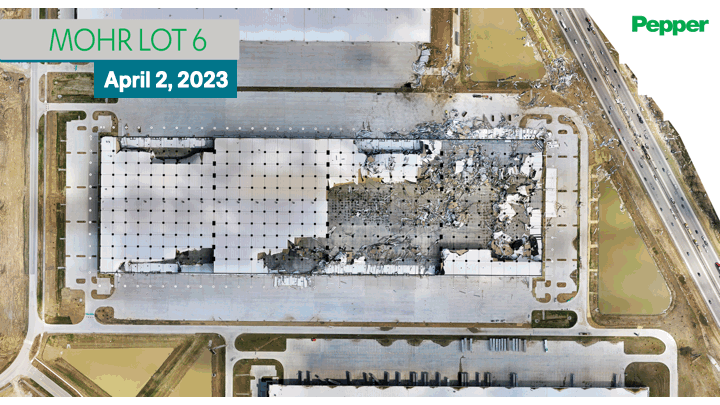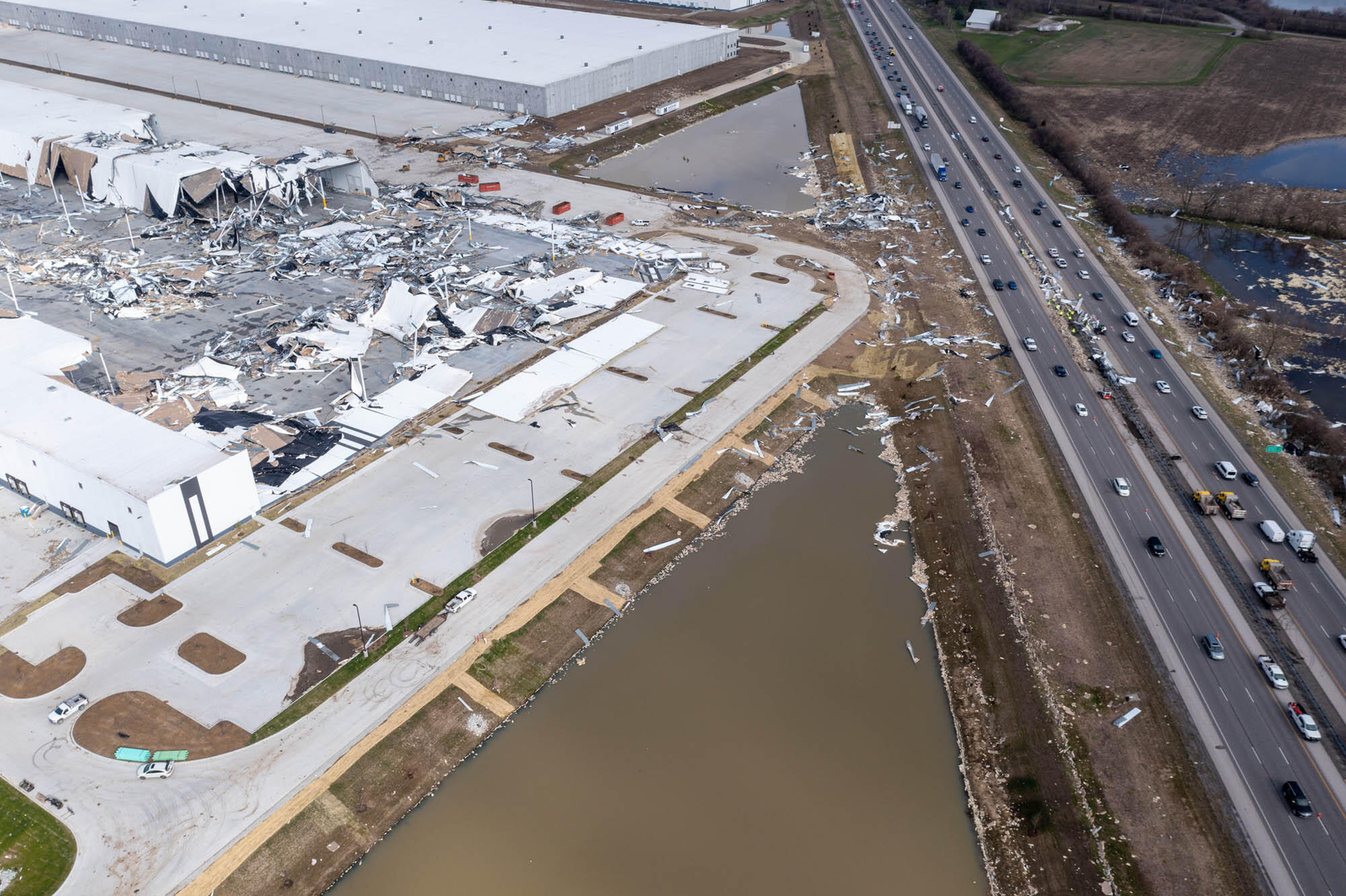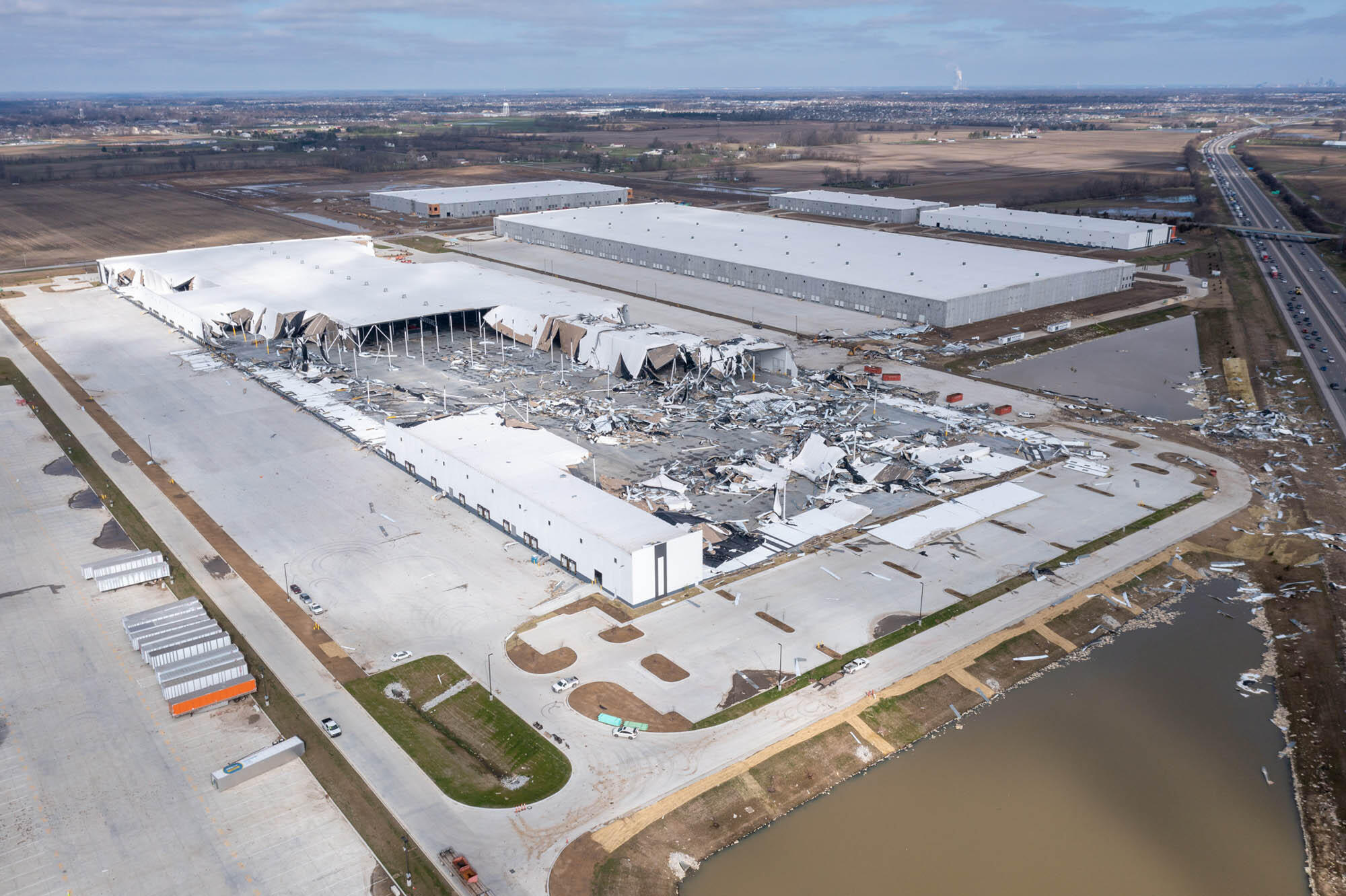Pepper Construction spent more than a year erecting Building 6 of the Mohr Logistics Park in Whiteland, Indiana, 1 million square feet of office and warehouse space spread out next to Interstate 65 and located about 20 miles south of Indianapolis.
Our construction crew closed-out work, cleaned up the site and took away the last of the equipment just as spring was starting. Possession of the property was set to transfer over to Mohr Capital, the Texas real-estate development company, at midnight April 1, 2023—April Fool’s Day, it would later be ruefully noted.
The tornado hit just half an hour before the building officially changed hands.
Whiteland, population 4,700, took some of the worst of a series of storms that swept the Midwest that early morning. An EF-3 tornado as wide as three football fields carved an almost four-mile gash through the town—and through the just-finished Pepper facility. The next day, Indiana Gov. Eric Holcomb declared a state of emergency for Whiteland’s Johnson County and for Sullivan County in west central Indiana, where at least three people died. In all, some 17 tornadoes struck the state.
To those arriving at the completed jobsite soon after the roughly 200 mile-per-hour winds passed, only cliches could come close to describing what they saw. It looked like a bomb exploded in the middle of the sprawling complex, with its steel, insulation, drywall and concrete strewn across the interstate and up to five miles away.
One year later, the recovery in Whiteland continues, but at its once-ruined construction site, our team has managed to wind the clock back to before the storms struck. The building is once again whole and its tenants are busy moving in furniture and equipment.
“You don’t just walk away and quit,” says Jim Pawelczyk, senior superintendent on the project. “It’s the right thing to do—to be a good neighbor.”
April Fool's Day
Project Manager Rodney Yowell, of Danville, Indiana, was the first Pepper team member to learn that his just-finished building was destroyed. The ringing of the phone close to midnight didn’t totally surprise him, though. He had been following the weather updates and scrolling Twitter while watching the women’s Final Four on TV when he came across a photo and immediately recognized the partially flattened warehouse.
He waited until daylight to go to the site but just barely. In the still-orange morning light, he was staggered by what he saw.
“It was unbelievable,” he says. “It’s something I’ll never forget.”
Pawelczyk, of Cloverdale, Indiana, was close behind and, like Yowell, arrived dressed for work.
“The amount of destruction that storm did was amazing,” he says. He was especially struck by the sight of steel beams twisted “like pretzels.” “It was a mess,” he says.
Mohr Capital Chief Development Officer Gary Horn told The (Franklin, Indiana) Daily Journal that he first thought the early-morning call to tell him the news was an April Fool’s Day prank. “Obviously, we were shocked,” he said, “but we were thankful that the building was not fully occupied. It’s just amazing that it came through the town and there were no fatalities.”
Whiteland’s tornado didn’t claim any lives but completely destroyed 16 homes and damaged more than 70 others. It blew down trees, knocked out power, crushed cars, blocked roads, shuttered businesses and thrust countless people into confusion and uncertainty. What followed, however, was “a real good team effort,” as Pawelczyk describes it, and a story to feel good about amid all the suffering the storm caused.
As the 60-strong Pepper crew set out to collect all the debris blown off the site, we encountered many people at a loss as to what to do. In that lull before emergency crews and insurance adjusters could fully assemble, we knew we needed to pitch in.
Pawelczyk describes one man with a yard full of splintered trees and mangled metal whom he told he would come back to help. He could tell the man didn’t believe him. But two hours later, Pawelczyk was back with dozens of fellow employees, plus dumpsters and bobcats. Pawelczyk still remembers the look on the homeowner’s face.
“It’s just the right thing to do,” he shrugs.
Farmer Keith Hardin was one Whiteland resident amazed by the surprise help from his giant neighbor.
“I am extremely grateful,” he told The Daily Journal back in November. “We’d still be working on it. I wouldn’t have been able to plant pumpkins this year if they hadn’t come over and helped clean up. They literally were there every day—even rainy days. It was a huge task.”
Carmen Young is director of administration for the town of Whiteland and filled in for an absent town manager in the aftermath of the storm. She says Pepper and Mohr proved good neighbors in even larger ways—by committing to rebuilding the site and by convincing the future tenant to wait a little longer. The size of the facility, the local jobs it will create and its economic impact on the small town cannot be overestimated, Young says.
The logistics park has enabled Whiteland to grow in a new way: “We didn’t have the industrial market,” Young says. “The one thing I’m just in awe of is that Pepper rebuilt that building as fast as they did.”
Make a plan and stick to it
Project Director Sam Fugate says the most daunting part of rebuilding was pinpointing exactly how much damage the tornado had caused and how much work we would have to replicate. It took over a month just to clean the site up enough to get a firm grasp on what was salvageable. In the meantime, the team met regularly with all involved and leaned on our strong relationships with subcontractors and trade partners.

“I would say our overall commitment to a consistent plan,” Fugate says, "is what enabled us to turn the property around in just six months after an initial prediction of 10 months. A clear plan and even clearer communication provided some calm in a chaotic environment.
“There was a little bit of a chip on our shoulder too, when people said we couldn’t do it,” Fugate laughs. “Proving people wrong can be pretty motivating.”
The rebuilt project was finally handed off officially in November 2023.
“Most people have taken it as a positive experience,” Young says of the storm a year later. “Everyone just came together and helped.”
For Fugate, that’s what made him most proud to be part of the team.
“That’s Pepper, that’s our culture. Guys like Jim,” Fugate says. “He could have stopped at the property line, but he didn’t.”
He also helped make at least one important change to the rebuilt facility: It now has a storm shelter.



